Check out some of these new acquisitions to the OISE Library collection – just in time for the start of the school year!
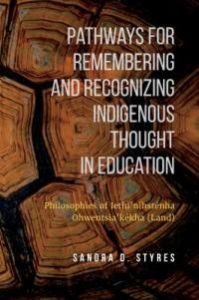 Pathways for Remembering and Recognizing Indigenous Thought in Education: Philosophies of Iethi’nihsténha Ohwentsia’kékha (Land), Sandra D. Styres
Pathways for Remembering and Recognizing Indigenous Thought in Education: Philosophies of Iethi’nihsténha Ohwentsia’kékha (Land), Sandra D. Styres
Approaching the topic of Indigenous thought from a Kanien’kehá:ka (Mohawk) perspective, Styres deconstructs the complexities of Indigenous education in Canada and explores how Indigenous philosophies relate to the current educational system. Styres clearly states that this book is not intended to be the answer to the issues related to Indigenous education, nor does she seek to present decolonization as the sole solution – instead, she presents her book as a means of adding to our understanding of Indigenous knowledge and seeks to articulate the role that decolonization may play in the process. Divided into five sections with overarching themes drawn from Hodenosaunee and Anishinaabe traditions, this book explores concepts of iterativeness, circularity, and land. Through these, Styres discusses how Indigenous “philosophies of Land” can disrupt and challenge colonial power and how traditional teachings can be brought into contemporary contexts.
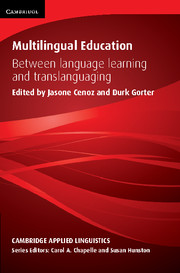 Multilingual Education: Between Language Learning and Translanguaging, eds. Jasone Cenoz and Durk Gorter
Multilingual Education: Between Language Learning and Translanguaging, eds. Jasone Cenoz and Durk Gorter
In our increasingly globalized world, multilingualism is becoming more and more commonplace – and the classroom is no exception to this. Written by a host of researchers in the field, the chapters of this book feature recent developments and research in multilingual education. This book discusses multilingualism in educational settings around the world, examining a variety of contexts, such as the use of Chinese and English in Hong Kong, or Spanish and English in the USA. The authors present the concepts of “becoming multilingual” and “being multilingual” as two points on a spectrum rather than a mutually exclusive dichotomy. The idea that students should be guided toward monolingualism is firmly rejected; this book looks instead to ways of better integrating multilingualism into the curriculum.
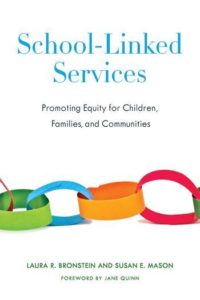 School-Linked Services: Promoting Equity for Children, Families, and Communities, Laura R. Bronstein and Susan E. Mason
School-Linked Services: Promoting Equity for Children, Families, and Communities, Laura R. Bronstein and Susan E. Mason
Children from low-income families are often at a disadvantage when it comes to enrichment opportunities. This book examines the ways in which integrating community services with schools can address the achievement gap and help break the cycle of poverty. Bronstein and Mason provide the reader with an overview of the services, programs, initiatives, and relationships that are “crucial for children’s success in school and life,” such as after-school and summer sessions, youth leadership opportunities, and school-linked health and mental health services. This book addresses issues of implementation, including a discussion of the policy and funding requirements for both rural and urban contexts and a look at how school-linked services have been implemented in other parts of the world.
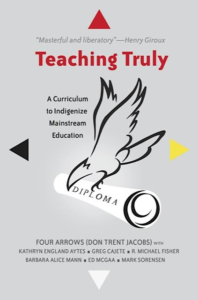 Teaching Truly: A Curriculum to Indigenize Mainstream Education, Four Arrows (Don Trent Jacobs)
Teaching Truly: A Curriculum to Indigenize Mainstream Education, Four Arrows (Don Trent Jacobs)
Policy and curriculum changes can take a long time to implement; instead of waiting, this book provides guidelines for immediate ways to incorporate Indigenous approaches to education into the classroom. In addition to providing historical context and an overview of Indigenous teaching and learning, this book addresses eight different subject areas and provides practical suggestions for curriculum and lesson planning for each. Each of these chapters also includes a look at the real-world outcomes of these approaches as well as questions to promote further thought, research, and dialogue. Four Arrows argues that integrating mainstream education and Indigenous teaching and learning across all grade levels and subject areas will result in “more meaningful, truthful, and equitable educational experiences” for all students.
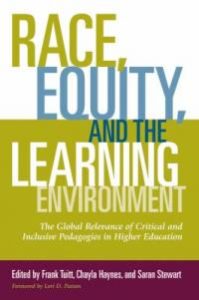 Race, Equity, and the Learning Environment: The Global Relevance of Critical and Inclusive Pedagogies in Higher Education, eds. Frank Tuitt, Chayla Haynes, and Saran Stewart
Race, Equity, and the Learning Environment: The Global Relevance of Critical and Inclusive Pedagogies in Higher Education, eds. Frank Tuitt, Chayla Haynes, and Saran Stewart
As post-secondary campuses become increasingly diverse, addressing the systematic barriers encountered by racially and ethnically diverse students is paramount. This book is divided into three parts, which discuss the underlying philosophy of critical and inclusive pedagogies, orient the classroom in a sociopolitical context, and look at the effects that critical and inclusive pedagogies have on the classroom and on the broader community. With chapters written by scholars and researchers from across academic disciplines in multiple countries, this book examines critical and inclusive pedagogies and how these can be leveraged to promote equitable educational opportunities and outcomes for all students.
